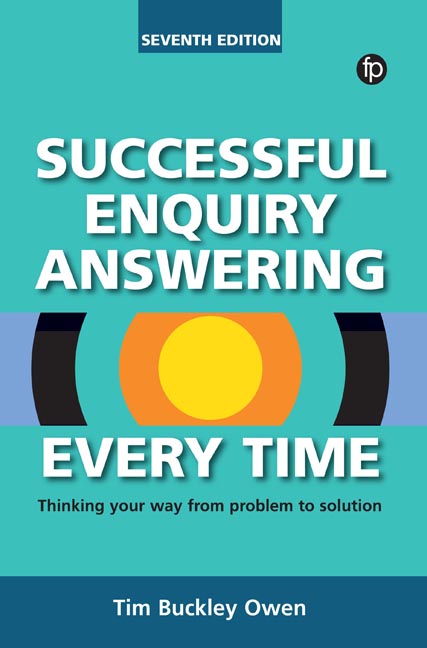Book contents
- Frontmatter
- Dedication
- Contents
- Introduction: Why thinking skills matter
- Eight essential thinking skills for successful enquiry answering
- 1 What do they really want? Using your analytical thinking skills to understand the question
- 2 Why remote enquiry handling is different Anticipating problems by thinking empathetically
- 3 Getting started Dealing with the panic by thinking imaginatively
- 4 Smarter searching Developing efficient search strategies by thinking systematically
- 5 Help! Everything's going wrong Using lateral thinking to get out of difficulties
- 6 Success! Now let's add some value Using your creative thinking skills to present your answer well
- 7 Don't just give me another reading list! Using critical thinking skills to add further value to your answer
- 8 Choosing your toolkit Using your predictive thinking skills to determine the resources you'll need
- Index
- Miscellaneous Endmatter
Introduction: Why thinking skills matter
Published online by Cambridge University Press: 08 June 2018
- Frontmatter
- Dedication
- Contents
- Introduction: Why thinking skills matter
- Eight essential thinking skills for successful enquiry answering
- 1 What do they really want? Using your analytical thinking skills to understand the question
- 2 Why remote enquiry handling is different Anticipating problems by thinking empathetically
- 3 Getting started Dealing with the panic by thinking imaginatively
- 4 Smarter searching Developing efficient search strategies by thinking systematically
- 5 Help! Everything's going wrong Using lateral thinking to get out of difficulties
- 6 Success! Now let's add some value Using your creative thinking skills to present your answer well
- 7 Don't just give me another reading list! Using critical thinking skills to add further value to your answer
- 8 Choosing your toolkit Using your predictive thinking skills to determine the resources you'll need
- Index
- Miscellaneous Endmatter
Summary
Twenty-one years ago – almost to the day actually – I rented a small holiday cottage on the Isle of Wight, hired a large and clunky computer from a local firm (for rather more than the cost of renting the cottage) and settled down to draft the first edition of this book. At that time I never thought there would be a second edition, let alone a seventh.
Since then, some things have come full circle. We now live on the Island most of the time, so it's here again that this edition has been penned. But when it comes to the information profession – the people whose job is to answer enquiries for a living – it's difficult to decide whether we're talking about a straight road from the book-lined room to a world of virtual crowdsourced content or, again, about a situation where things have come full circle.
Let me explain. When people want to satisfy their immediate curiosity these days they're much more likely to turn to social media on their mobile device than ask their local library. So the days of flesh and blood intervention in this kind of quick reference enquiry are inevitably numbered.
But the professional skills that underpin them are not. They keep coming round and they work for anyone whose job is to provide information, advice and guidance using third party sources to help them. So they're also transferrable skills, relevant not only in libraries but also for anyone whose job is to provide learning support to students, work with research teams or offer contact centre services.
In my work as a trainer, I'm increasingly being asked to develop modules and courses that address new value-added activities, and particularly in taking the process beyond the traditional outcome: delivery of raw literature search results with no further comment. Clients for this kind of training include specialist organizations of all kinds, government, law firms and, most recently, health bodies.
So although the book's coverage of the underlying skills remains fundamentally the same, I felt that at least some of the emphasis needed to change. Particularly in the later chapters, there's now much more focus on the information professional's role in things like fostering information literacy, managing the desk research process and presenting research results effectively.
- Type
- Chapter
- Information
- Successful Enquiry Answering Every TimeThinking your way from problem to solution, pp. xi - xivPublisher: FacetPrint publication year: 2017



